In my initial invention of this post title, I was unaware of the literal deluge that was about to hit my part of the world. Now I am unsure about the performance deluge to which the post was initially dedicated. While some programming in NY has continued its regular scheduling, there has been much rescheduling and postponement due to power outages and flooding throughout the city. While The Kitchen has made great strides towards repair, which will cost hundreds of thousands of dollars, the entire lobby and much of the theater was demolished from the flooding.
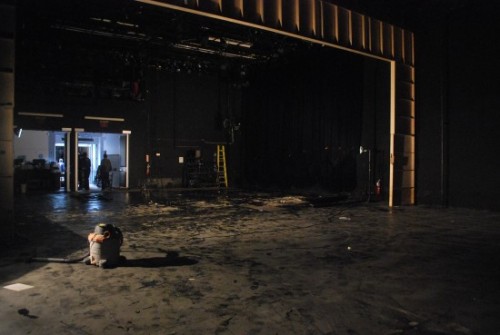
View looking out from the theater of The Kitchen. Image credit: Sarah McSherry, theperformanceclub.org.
Many other spaces were hit hard by Hurricane Sandy, resulting in artists losing the contents of their studios, as well as galleries losing artists’ works. I received multiple updates from Printed Matter on the loss of thousands of dollars worth of archival materials, not only of work by important artists, but of materials that served to document the history of the space itself. It’s heartening that many people have volunteered to help sort through the ruins and work to recover these worlds. While benefits and membership drives are already de riguer for arts-related organizations this month, the need for funding has grown twofold as a result of the hurricane’s devastating aftermath.
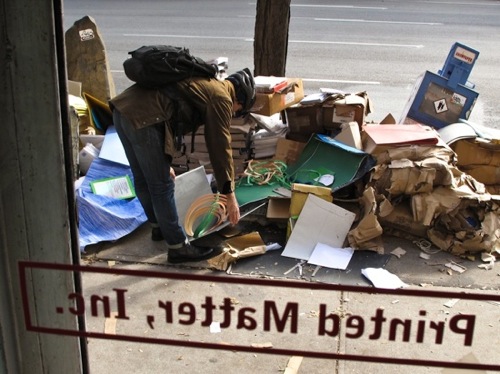
Gutting Printed Matter of work destroyed by Sandy. Image credit: Printed Matter.
For almost two weeks, my own life was put on hold. I traveled into the city on foot, walking the Williamsburg Bridge to help friends in the Lower East Side relocate to Brooklyn, because the trains were mostly out of commission. In Bushwick, artist Megan Byrne, who has been living at the Secret Works Loft for several years, solicited donations from neighborhood residents to be shuttled to Occupy Sandy. In a phone conversation Byrne described her situation and the cooperation of her neighbors thusly:
“I started taking donations on Friday, November 2. There were no donation sites within walking distance, and public transportation was shut down. I fliered within a block radius, hit all the coffee shops, and the floors of my building. I contacted the Occupy Sandy organizers with my address and they had it up on their website within 24 hours. The turnout was incredible. Each small donation added up to a lot of supplies. The majority of people that came I had never met before. Everyone had a look of devastation on their face . Many people asked what else was needed, and would come back the next day with more supplies. People with cars took the supplies and chipped in. Last week, someone arrived at my door with 200 peanut butter and jelly sandwiches, and then an hour later someone came by asking me if there was anything that needed to be driven out there. This rhythm kept happening, each time I felt overwhelmed someone would come by and help. The eleven others living here kept it running, too.”
As everyone involved in these efforts has now gone back to work, the loft is now taking donations by appointment.
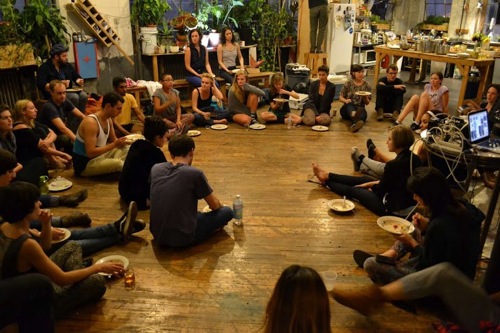
Dinner before AUNTS’ “regular,” end of Summer show. Image credit: AUNTS.
Byrne’s philosophy of cooperation and sharing resources comes directly through her choice to live in the loft. “ I have needs that just couldn’t be met in another way. I’m like a pack animal, not a loner. I think it’s important to share the resources of space and time. It’s sad, our resources are literally crumbling at our feet. The Occupy Movement is people helping people, and this is what we need right now. Our way of living [at the loft] is something that society still needs to consider, sharing resources, etc. We often get commercial bids for video and photo shoots, and we decline them. We want to be a community space.” Byrne is a participant in the ongoing dance series, AUNTS, co-directed by Laurie Berg and Liliana Dirks-Goodman at Secret Works Loft and at various locations throughout the city. Their most recent event,”COLLECTIVE AS CREATIVE COMMUNITY: AUNTS Permanent Collection” was presented as part of Movement Research-in-Residence at the New Museum. “While we were at the museum,” she says,”I made lunch for everyone every day. We want the greater community to feel that we are here for them.”
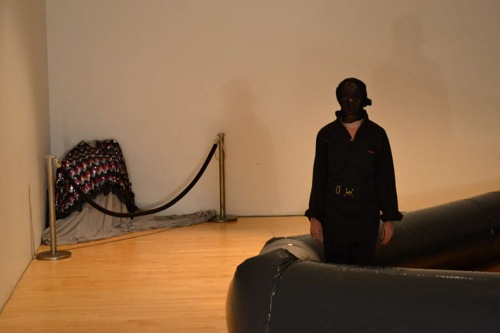
AUNTS as part of Movement Research-In-Residence at the New Museum. Image Credit: AUNTS.
For a scheduled interview with performance artist Adrienne Truscott, whose show …Too Freedom… was postponed at The Kitchen, we decided to talk on our way Rockaway Beach to participate in relief efforts there. My recording of the trip is a strange mix of Truscott’s stories of performing in Australia’s Brisbane Festival with The Wau Wau sisters (her collaborative duo with Tanya Gagne), and general chatter with dance artist Gillian Walsh, who helped navigate the trip. As soon as we hit the Rockaways, the tone of the conversation shifted, and we sat gasping at obliterated homes and storefronts.
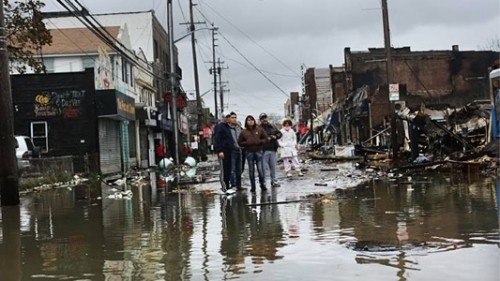
Area in the Rockaways where the storefronts were destroyed by electrical fires. Via abcnews.go.com.
Walsh, who had previously volunteered in the area, directed us to a storefront with a banner that read, “Yana.” Run by a host of Occupy Sandy volunteers working around the clock, the storefront is a storage space for cleaning supplies, canned food and warm clothing. Across the street a makeshift medical center had just opened, and we were given forms to bring to residents in need of prescription refills. We went to housing projects on Beach 98 St. with flashlights and clipboards, and went door-to-door throughout the 14 floors of a building. With no power and resources in the area completely washed away, the residents of the building are playing a waiting game, trying to simply survive the extreme conditions. The building is cold and dark, the hallways and stairwells, pitch black. The two heating generators on its first floor barely change the temperature of the upper floors. I spoke with elderly residents who had no way of leaving their apartments, and whose bodies could barely withstand the long, cold nights. I spoke with a woman my age who was about to run out of her asthma medication. She took the trip down from her 13th floor apartment once a day to save her lungs, giving her just enough strength to plug her cell phone into a generator and gather supplies from donations.
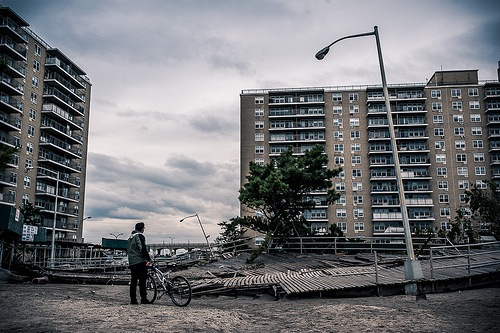
Demolished boardwalk with high-rises in the Rockaways. Image credit: Jonathan Auch. Via flickr.com.
While FEMA and Red Cross might be helping in different parts of the area, there is no question that Occupy Sandy was the first and most effective in its grassroots efforts to help people living in this area. The National Reserves might have resources, but it did not have a clear strategy in its intervention, and has been directed by Occupiers in some areas. I was shocked that even with all of these organizations with the potential to come to their aid, many people are still not finding comfort or assistance. Rockaway Youth Task Force and People’s Relief are working directly with residents in the Rockaways and Coney Island. As the President of LIPA (Long Island Power Authority) resigns and the debate continues about the lack of precautions taken to protect people in this area, it is clear that it will be a very long time before many New Yorkers get their lives back.

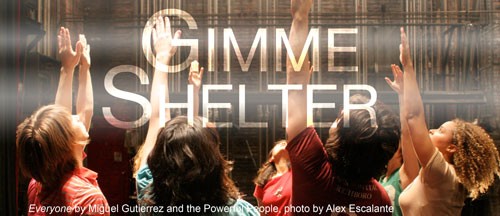



Pingback: Adrienne Truscott in conversation with Marissa Perel on “…Too Freedom…” premiering Dec. 8 2012 at the Kitchen « Critical Correspondence